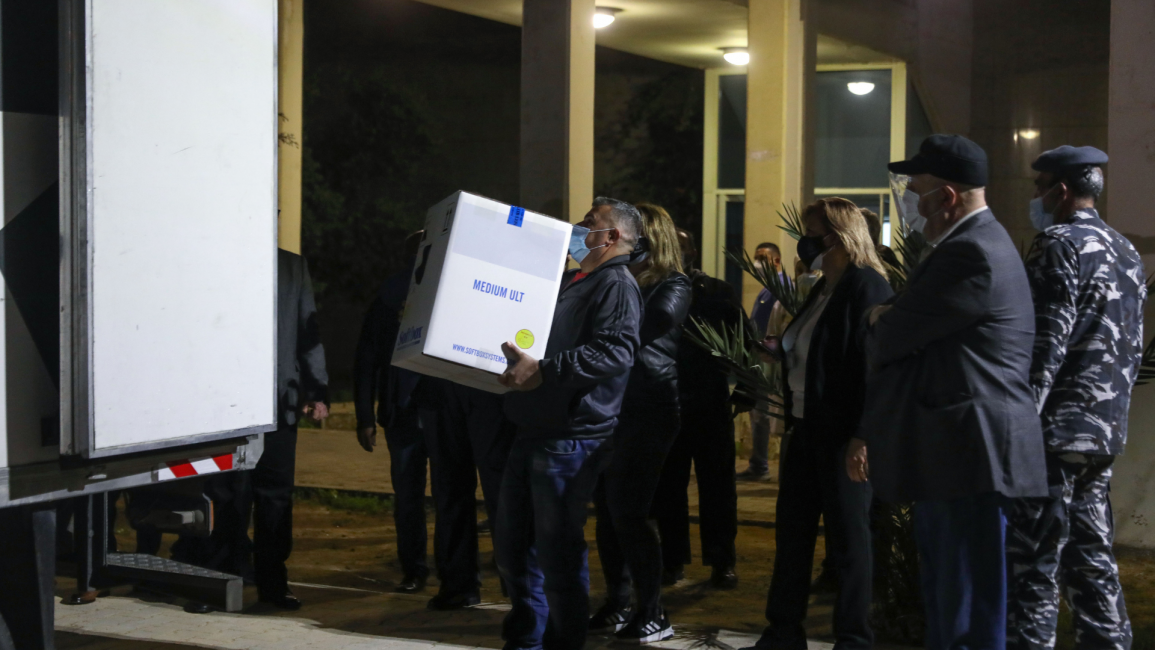Lebanon receives first 28,500 Covid vaccines amid surge in cases
A plane landed at the Beirut airport, an AFP correspondent reported, with authorities saying it was carrying 28,500 doses of Pfizer/BioNTech flown in from Belgium.
The shipment was the first after the World Bank allocated $34 million to inoculate two million of Lebanon's six million inhabitants.
Caretaker health minister, Hamad Hassan was on the tarmac to welcome the plane and expressed great "relief".
"It's a dream being realised today thanks to the support of our UN and international partners," he told reporters,
"The vaccine will reach all Lebanese citizens across the country," as well as Syrian and Palestinian refugees and other residents, he promised.
Lebanon has been under strict lockdown since mid-January, after an unprecedented spike in cases blamed on holiday gatherings that forced overwhelmed hospitals to turn away patients.
Vaccination rollout is set to start on Sunday.
Health workers will receive their first dose at the Rafik Hariri Hospital, the country's main public hospital tackling the Covid-19 outbreak, the American University of Beirut Medical Centre, and Saint George Orthodox Hospital.
"The best gift one can ask for on Valentine's Day," wrote the director of the Rafik Hariri Hospital, Firas Abiad, on Twitter.
Twitter Post
|
Prime Minister Hassan Diab, 61, is also to be vaccinated, his office said.
Under Lebanon's vaccination plan, medical staff and those over the age of 75 are to receive the jab first.
In total Lebanon hopes to receive around six million vaccine doses, including two million from Pfizer/BioNTech and another 2.7 million via the international Covax distribution programme.
Half a million people in Lebanon have signed up to receive a vaccine, a health ministry official said, although many are hesitant to get the jab.
Of 500 people surveyed by private think-tank Information International, 31 percent said they would get vaccinated, 38 percent said they would rather not, and another 31 percent were undecided.
Read also: HRW warns of 'gaps' in Lebanon Covid vaccine drive
Lebanon was already in the throes of its worst economic crisis in decades when Covid-19 hit, and the situation has been exacerbated after a massive blast at Beirut's port in August killed more than 200 people and destroyed large parts of the capital.
The World Bank and the International Federation of Red Cross and Red Crescent Societies (IFRC) are to monitor the rollout, they said in a statement on Friday.
They aim to "ensure fair, broad, and fast access to Covid-19 vaccines to help save lives and support economic recovery", World Bank regional director Saroj Kumar Jha said.
Lebanon says 334,086 people have caught coronavirus since February 2020, of whom 3,915 have died.
In January, Human Rights Watch expressed worry over Lebanon's inoculation drive.
The US-based rights group cited particular concern around the transparency, accessibility, and misinformation surrounding the drive to vaccinate Lebanon's population.
"The government's stated commitment to an inclusive vaccination strategy is positive, but the real test will be translating the plan into action," said Aya Majzoub, Human Rights Watch's Lebanon researcher, just two weeks ago.
"It is critical for leaders to clearly communicate the government’s vaccination strategy, ensure that vaccine access is not determined by political connections or socio-economic status, and apply transparent, evidence-based distribution criteria equally to everyone in Lebanon," Majzoub added in the statement at the time.
After speaking with frontline healthcare workers, the rights group said there was insufficient information over how the programme will be rolled out.
Hospital officials told HRW at the time they had not yet received any instructions from the government on how to operationalise the strategy.
Dr. Georges Ghanem, the chief medical officer of the LAU Medical Center-Rizk Hospital, one of Lebanon's largest private hospitals and one of the 42 vaccination centres, told HRW that a clear operational roadmap for the vaccination campaign remains missing.
"We have this broad plan, which is a plan of principles, but not an operational, on-the-ground plan," Dr. Ghanem said.
Ghanem added that they still do not know what software vaccination centres will use to register and schedule appointments and when staff members will be trained to use it.
Follow us on Facebook, Twitter and Instagram to stay connected



